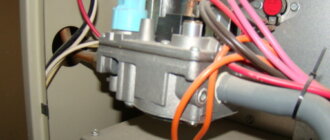Why Your Boiler Isn’t Heating
Are you feeling the chill in your home even though your boiler is on? Don’t let a malfunctioning boiler leave you shivering this winter. A properly functioning boiler not only keeps you warm but also ensures that your energy bills remain within budget. In this blog post, we’ll discuss some common reasons why your boiler isn’t heating and provide valuable information on maintenance to prevent future issues. So grab a cup of tea and let’s dive into understanding our boilers!
Importance of a properly functioning boiler
A properly functioning boiler is essential for a comfortable and safe home. Not only does it provide heat during cold months, but it also serves as a source of hot water for daily activities such as showering, washing dishes, and doing laundry.
When your boiler isn’t working correctly, it can lead to several issues that affect both your comfort and safety. For instance, if the temperature isn’t regulated or controlled appropriately, you could experience discomfort due to either excessive heat or lack of warmth.
Additionally, faulty boilers can pose serious health risks like carbon monoxide poisoning. This poisonous gas is colorless and odorless – making detection impossible without proper equipment. A malfunctioning boiler might produce this gas which when inhaled leads to severe health issues.
Regular maintenance checks are necessary to ensure that the boiler operates efficiently throughout its lifespan. Neglecting routine checkups may result in costly repairs or even total replacement of the appliance.
In summary, a functional boiler not only provides warmth but also ensures safety and peace of mind for homeowners; hence regular maintenance checks should be carried out by professionals to keep them running smoothly all year round.
Understanding Your Boiler System
Understanding Your Boiler System is crucial to the overall health of your heating system. It’s important to know how your boiler works, so you can identify any potential issues that may arise.
Boilers work by heating water which then circulates through the pipes and radiators in your home, providing heat throughout. The process begins when the thermostat signals for heat and sends a message to the boiler control panel.
The fuel source (oil, gas, or electricity) is then ignited or activated, heating up water inside the boiler tank. This heated water is then pumped through pipes leading to various points in your home where it releases its heat into each room.
Knowing how your boiler system functions will help you identify if there are any problems with its operation. For example, if certain rooms aren’t getting as warm as others or if you hear strange noises coming from the unit itself.
Regular maintenance checks on this complex system will keep it running smoothly and avoid costly repairs down the road. Understanding Your Boiler System means peace of mind knowing what goes on behind closed doors!
Importance of regular boiler maintenance
Regular boiler maintenance is essential to keep your heating system running efficiently and safely. A poorly maintained boiler can lead to costly repairs, breakdowns, or even dangerous situations like gas leaks or carbon monoxide poisoning.
A professional boiler service should include a thorough inspection of all components, cleaning of any dirt and debris buildup, testing for leaks or faults in the system, and ensuring that the settings are correctly calibrated. This will help identify any potential issues before they become major problems.
Regular maintenance also ensures that your boiler operates at maximum efficiency which means lower energy bills and reduced environmental impact due to less fuel consumption.
It is important not to ignore regular maintenance even if you think there’s nothing wrong with your system as preventative measures are always better than reactive ones. Investing in annual servicing will extend the life of your boiler while keeping it functioning safely and smoothly throughout the year.
Regular maintenance is crucial for both safety reasons and cost-effectiveness. So don’t neglect this vital aspect of maintaining a comfortable home environment!
Common Reasons Why Your Boiler Isn’t Heating
There’s nothing worse than realizing that your boiler isn’t heating when you need it the most, especially during those cold winter nights. Several factors could cause this issue, and in this section, we’ll look at some of the common reasons why your boiler may not be working correctly.
Reason 1: Thermostat Issues
One of the most common reasons why boilers stop heating is due to issues with the thermostat. The thermostat plays a crucial role in regulating the temperature of your home by communicating with your boiler when it’s time to start or stop heating.
If you notice that your boiler is not producing heat, check if your thermostat is set correctly. Sometimes, even a small adjustment can make a big difference. Ensure that the batteries are working well and replace them if necessary.
Another possible reason for malfunctioning thermostats could be their location within the house. If they are placed in drafty areas or near sources of heat such as radiators or direct sunlight, this will affect their accuracy.
It’s also worth noting that outdated thermostats may need replacement to ensure proper functionality. Investing in an energy-efficient programmable thermostat can help regulate temperatures more accurately while saving on electricity bills.
Addressing any potential issues with your thermostat can go a long way towards preventing costly repairs and ensuring efficient operation of your boiler system.
Reason 2: Low Water Pressure
One common reason why your boiler may not be heating is low water pressure. Water pressure in the system plays a crucial role in making sure that heat can circulate effectively throughout your home. If the water pressure drops too low, it can lead to poor performance and even cause damage to your boiler.
There are several reasons why you may experience low water pressure in your boiler system. The most common issue is a leak somewhere within your piping or radiator system. Leaks can occur for various reasons such as corrosion, wear and tear, or accidental damage.
Another possible culprit behind low water pressure could be an issue with the automatic filling valve. This component is responsible for maintaining proper levels of water within the system by adding more when needed automatically.
Air pockets trapped within pipes could also cause a drop in water pressure since they take up space meant for hot water flow.
If you notice any signs of low water pressure like unusual noises or cold spots on radiators, it’s best to call a professional immediately before things get worse.
Reason 3: Leaking or Dripping
If you have noticed your boiler isn’t heating up, one of the reasons could be a leaking or dripping issue. Leaking or dripping can occur in various parts of the boiler such as the pipes, valves, and even the tank itself.
A common cause of leaks is corrosion due to age or poor maintenance. Over time, rust and other forms of damage can weaken different parts of your boiler system causing them to leak. Additionally, high pressure within your system may also lead to leaks.
Another reason for leakage might be faulty seals around pipes and valves resulting in water escaping from its intended path. This issue requires immediate attention as it can cause significant damage if left unchecked.
Moreover, mineral build-up inside the tank caused by hard water can also result in leaking problems over time. The minerals that accumulate on internal surfaces restrict flow which eventually leads to leaks.
Leaking issues should never be ignored because they pose a health hazard and could lead to costly repairs down the road if not addressed promptly by a professional technician specializing in boiler repair services.
Reason 4: Broken Pump
A broken pump is another common reason why your boiler may not be heating properly. The pump plays a critical role in circulating hot water from the boiler to the radiators and back again, providing heat throughout your home.
If the pump becomes faulty or breaks down completely, it can cause issues with water flow within the system. This can lead to poor circulation and ultimately result in cool spots on your radiators or a complete lack of heat altogether.
There are several signs that may indicate that your boiler’s pump is damaged or not functioning correctly. These include unusual noises coming from the pump itself, leaks around the unit, and inconsistent temperature levels throughout different areas of your home.
If you suspect that there might be an issue with your boiler’s pump, it’s crucial to address it as soon as possible by calling a professional technician. Attempting DIY repairs could exacerbate existing problems which would only end up costing you more money in repair bills later on.
When to Call a Professional
When it comes to boiler issues, it can be tempting to try and fix the problem yourself. However, there are times when you should call a professional instead.
For example, if your boiler is making strange noises or emitting unusual smells, this could be a sign of a serious problem that requires professional attention. Similarly, if your boiler repeatedly fails to heat up despite attempting troubleshooting methods such as checking the thermostat and water pressure levels, it’s time to call in an expert.
Attempting DIY solutions for more complex problems like leaks or pump malfunctions can lead to further damage or even dangerous situations. A certified technician has the skills and equipment necessary to safely resolve these types of issues.
Additionally, regular maintenance checks performed by professionals can prevent issues from occurring in the first place. It’s often best to schedule annual maintenance appointments with a trusted professional rather than waiting for something major to go wrong.
Remember: while it may seem cost-effective in the short term to attempt fixing your own boiler troubles, calling a professional is ultimately safer and more efficient in ensuring long-term functionality of your heating system.
Conclusion
A properly functioning boiler is crucial for the comfort and safety of your home or office. Understanding how your boiler system works, performing regular maintenance, and troubleshooting any issues that may arise will ensure that your heating system performs at its best.
Remember to always check the thermostat settings, water pressure levels, leaks or dripping in pipes and valves, and pump functionality if you experience issues with your boiler not heating up. If you’re unsure about handling these tasks yourself or are experiencing more complex issues with your boiler system, it’s best to call in a professional technician.
By taking care of your boiler through proper maintenance and timely repairs when needed, you’ll be able to keep it running efficiently for years to come while also avoiding costly expenses down the road. So don’t neglect those warning signs – take action today to keep your home warm and comfortable all year round!
Recent Queries:



